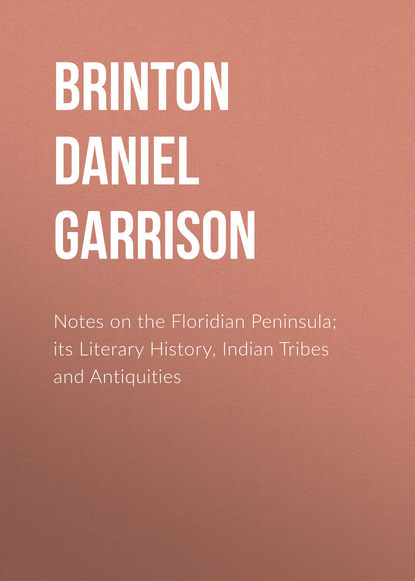 Полная версия
Полная версияNotes on the Floridian Peninsula; its Literary History, Indian Tribes and Antiquities
329
For particulars concerning some of these, see Wm. Bartram, Travels, pp. 145, 165, 206, 230; Notices of E. Florida, by a recent Trav., pp. 28, 44; American Journal of Science, Vol. XXV., p. 165, I., (2 ser.) p. 39.
330
Flint, (Travels, Let. XVI., p. 172,) says that neither of those found in 1810 measured more than four feet. This is an error. He only saw the female, whose age was not over fourteen, and the squatting position in which the body was, deceived him.
331
Conq. de la Florida, Lib. V., P. II., cap. VIII.
332
In French’s Hist. Coll. of La., Pt. I., p. 61.
333
Mems. Hist. sur la Louisiane, T. I., pp. 154-5.
334
Hist. of Louisiana, Vol. II., p. 230.
335
A New Account of Carolina, p. 191.
336
Joutel, Jour. Hist., p. 218; Mems. of Sieur de Tonty, p. 61; Dupratz, V. II., p. 22; Cabeza de Vaca. in Ramusio, T. III., fol. 317, E.
337
Lawson, ubi suprà, p. 180.
338
It was remarked of the mummy found in the Mammoth cave, “In the making of her dress there is no evidence of the use of any other machinery than bone and horn needles.” (Collin’s Kentucky, p. 257.)
339
Archæologia Americana, Vol. I., p. 230.
340
Whence the French verb boucaner, and the English buccaneer. Possibly the custom may have been introduced among the tribes of the northern shore of the Gulf by the Caribs.
341
Dumont, Mems., Hist. sur la Louisiane, T. I, p. 240.
342
De Bry, Peregrinationes in America, P. I., Tab. XXII.; Beverly, Hist. de la Virginie, Liv. III., pp. 285-6; Lawson, Acc’t of Carolina, p. 182; Schoolcraft, Hist. Ind. Tribes, Vol. V., p. 693.
343
See the Inca, Lib. IV., caps. VIII., IX.
344
See the Am. Jour. of Science, Vol. I., p. 429; Vol. XXII., p. 124; Collin’s Kentucky, pp. 177, 448, 520, 541; Bradford, Am. Antiqs., Pt. I., p. 29.
345
Dumont, Mems. Hist. T. II., pp. 178, 238; Dupratz, Vol. II., p. 221, and for the latter fact, Mems. of the Sieur de Tonty, p. 61.
346
Medical Repository, Vol. XVI., p. 148. This opinion is endorsed by Bradford, Am. Antiqs., p. 31.
347
Humboldt, Krit. Untersuch. ueber die Hist. Entwickelung der Geog. Kentnisse der neuen Welt, B. I., s. 322; the same reason is given by De Laet, Descrip. Ind. Occident. Lib. IV., cap. XIV.
348
“Guañines de oro,” Navarrete, Viages, Tom. III., p. 52; Herrera, Dec. I., Lib. IX., cap. XI.
349
Mais on n’y trouve pas d’or, parce qu’elle est eloignè des mines d’Onagatono, situées dans les montagnes neigeuses d’Onagatono dernieres possessions d’Abolachi, Memoire, p. 32.
350
Pedro Morales, in Hackluyt, Vol. III., p. 432.
351
See Lanman’s Letters from the Allegheny Mountains, pp. 9, 26, 27; White, Hist. Coll. of Georgia, pp. 487-8.
352
Humboldt, Island of Cuba, p. 131, note.



